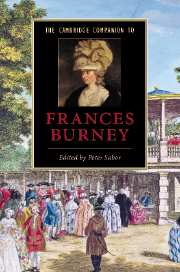Book contents
- Frontmatter
- Introduction
- 1 The Burney family
- 2 Evelina and Cecilia
- 3 Camilla and The Wanderer
- 4 Burney as dramatist
- 5 Journals and letters
- 6 Burney and politics
- 7 Burney and gender
- 8 Burney and society
- 9 Burney and the literary marketplace
- 10 The afterlife and further reading
- Further reading
- Index
- Series List
6 - Burney and politics
Published online by Cambridge University Press: 28 September 2007
- Frontmatter
- Introduction
- 1 The Burney family
- 2 Evelina and Cecilia
- 3 Camilla and The Wanderer
- 4 Burney as dramatist
- 5 Journals and letters
- 6 Burney and politics
- 7 Burney and gender
- 8 Burney and society
- 9 Burney and the literary marketplace
- 10 The afterlife and further reading
- Further reading
- Index
- Series List
Summary
Near the end of Burney's first published novel, Evelina, or the History of a Young Lady's Entrance into the World (1778), there is a farcical contretemps. Rough Captain Mirvan brings a monkey, 'full dressed, and extravagantly à-la-mode!', into the assembled company, chiefly to make fun of the snobbish fop Mr Lovel, who has been a plague to Evelina (399). Lovel, enraged at being confronted with what he is told is his likeness, strikes the monkey which then 'fastened his teeth to one of his ears'. Lovel, 'a dreadful object' with blood from his ear 'trickling down his cloaths', naturally objects to this treatment, but Mirvan is unapologetic:
'What argufies so many words?' said the unfeeling Captain, 'it is but a slit of the ear; it only looks as if you had been in the pillory.' 'Very true,' added Mrs. Selwyn, 'and who knows but it may acquire you the credit of being an anti-ministerial writer?'
(401-2)Mrs Selwyn is usually a woman of tough good sense; it may be a surprise to find her as 'unfeeling' as Mirvan. Her taunt carries the altercation into the overtly political realm. We could already have gathered, when hearing that Mrs Selwyn 'had business at a pamphlet-shop', that she likes to keep abreast of the news (318). Recalling punishments administered earlier in the century to dissident journalists and pamphleteers like Defoe, she ironically transforms Lovel into a writer protesting against the government in the era of the American War. Lovel would be undergoing a form of martyrdom for his principles and utterances which would gain him (in some liberal eyes at least) 'credit'. In fact, Lovel, an ignorant Member of Parliament and fashion's slave, utters little of note (save malicious digs at supposed inferiors), and would never be capable of going against any ministry in power in any matter.
- Type
- Chapter
- Information
- The Cambridge Companion to Frances Burney , pp. 93 - 110Publisher: Cambridge University PressPrint publication year: 2007
- 2
- Cited by

